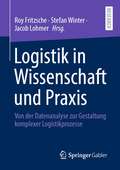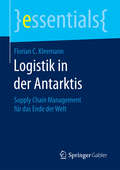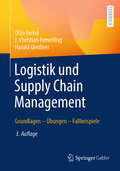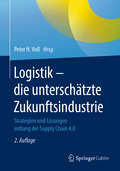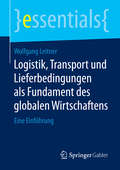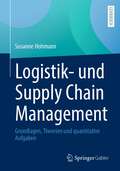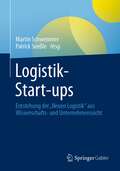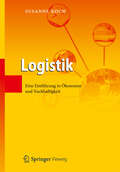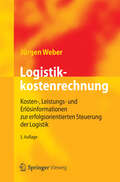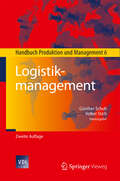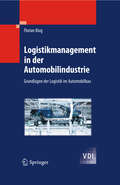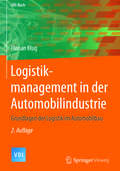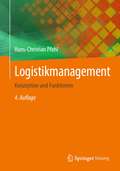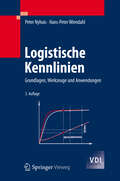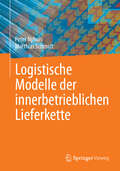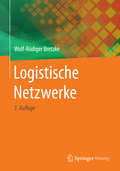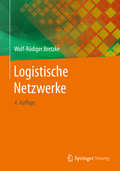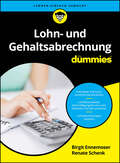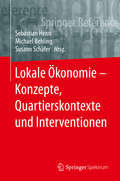- Table View
- List View
Logistik in Wissenschaft und Praxis: Von der Datenanalyse zur Gestaltung komplexer Logistikprozesse
by Stefan Winter Jacob Lohmer Roy FritzscheDieser Sammelband besteht aus aktuellen wissenschaftlichen Beiträgen aus allen Fachbereichen, die Prof. Lasch in seiner Wirkungszeit am Lehrstuhl für BWL, insb. Logistik, erforscht hat und weiterhin erforscht. Kolleg*innen, Schüler*innen und Freunde wurden eingeladen, einen wissenschaftlichen Artikel zu dieser Festschrift beizutragen. Die wirtschaftswissenschaftlichen Themengebiete umfassen Digitalisierung und Optimierung der Beschaffung, Supply Chain Management und Supply Chain Risk Management, Industrie 4.0 und digitale Technologien in der Logistik und SCM, Komplexitätsmanagement in der Logistik und SCM, Produktionsplanung und -steuerung sowie Intralogistikplanung und die Optimierung von Logistikprozessen in der humanitären Hilfe.
Logistik in der Antarktis: Supply Chain Management für das Ende der Welt (essentials)
by Florian C. KleemannFlorian C. Kleemann erarbeitet erstmals f#65533;r die internationale Logistik ein fundiertes Regionenprofil der Antarktis, des wei#65533;en Kontinents am s#65533;dlichen Ende der Welt. Der Autor analysiert dabei logistische Rahmenbedingungen im Bereich Politik, Recht, Wirtschaft und Klima. Fallstudienbasiert werden zudem wesentliche Besonderheiten f#65533;r die antarktische Logistik herausgearbeitet und in den Kontext eines modernen ,,Supply Chain Management" eingebettet. Bez#65533;ge bestehen dabei zur logistischen Infrastruktur, zu besonderen Transport- und Ladungstr#65533;gern sowie zu spezifischen Planungs- und Managementanforderungen. Neben tiefen Einblicken in die Besonderheiten der Logistik in Polarregionen entsteht so ein Analyseraster, das auch f#65533;r etablierte logistische Weltregionen genutzt werden kann. Zudem werden pragmatische Handlungsempfehlungen f#65533;r Logistiker und Supply Chain Manager bereitgestellt.
Logistik und Supply Chain Management: Grundlagen – Übungen – Fallbeispiele
by J. Christian Femerling Otto JockelDieses Buch ist ein auf die Bachelor-Ausbildung abgestimmtes und leicht verständliches Basiswerk sowie Arbeitsbuch zur Logistik. Es stellt die logistischen Grundlagen und die wichtigen Teilgebiete modular und anschaulich dar. Jedes Kapitel enthält Lernziele sowie zahlreiche Fallbeispiele, die das jeweilige Themengebiet mit Praxisfällen ergänzen.Die 3. Auflage wurde aktualisiert und grundlegend überarbeitet. Neue Kapitel heben insbesondere die Bedeutung von Wertschöpfungs-, Güter- und Logistikketten hervor. Ergänzungen umfassen Themen wie Kreislauf- und Entsorgungswirtschaft, Instandhaltungs- und Ersatzteillogistik. Ein zusätzliches Kapitel zum Supply Chain Risk Management analysiert Risiken wie Naturkatastrophen, geopolitische Konflikte und Handelsbeschränkungen, die globale Netzwerke erheblich beeinflussen. Es unterstreicht die Notwendigkeit eines ganzheitlichen Risikomanagements, unterstützt durch innovative IT-Systeme. Darüber hinaus wurden branchenspezifische Lösungen für die Chemie-, Textil- und Lebensmittelindustrie erweitert sowie Einblicke in zukünftige Trends und Entwicklungen beschrieben, die das Supply Chain Management und die Logistik gestalten und beeinflussen.
Logistik – die unterschätzte Zukunftsindustrie: Strategien und Lösungen entlang der Supply Chain 4.0
by Peter H. VoßDieses Buch stellt die vielfältigen Prozesse, Einflussgrößen und Perspektiven der Logistikindustrie anschaulich dar. Dabei reicht das Themenspektrum von der Digitalisierung der Supply Chain mit IoT, Machine Learning, Data Mining, Blockchain und Big Data über Automatisierung in der Lager-/Transportlogistik und des Onlinehandels bis hin zur Organisation der letzten Meile, zu Fragen des Versicherungswesens, der Sicherheit sowie zur Haftung von Logistikunternehmen. Die Autoren – renommierte Vertreter der Logistik oder kooperierender Branchen, Unternehmensberater und Wissenschaftler mit langjähriger Erfahrung auf dem Logistiksektor – bieten einen spannenden Blick auf die gegenwärtigen und zukünftigen Trends der Logistik.
Logistik, Transport und Lieferbedingungen als Fundament des globalen Wirtschaftens: Eine Einführung (essentials)
by Wolfgang LeitnerWolfgang Leitner erläutert ausgewählte Teilbereiche der Transport-, Umschlag- und Lager-Logistik (TUL-Logistik). Denn die operationalen Prozesse der TUL-Logistik haben in den letzten Jahren insbesondere durch die Globalisierung von Beschaffung, Produktion und Distribution an Bedeutung gewonnen. Naturgemäß hat sich allerdings auch deren Komplexitätsgrad entsprechend erhöht. Dies gilt sowohl in den Dimensionen Flexibilität, Lieferzeit und Liefertreue sowie den Kostenanforderungen aufgrund der Bedürfnisse des Marktes bzw. der Konsumenten als auch aufgrund der steigenden Modularität der Produkte und damit der Wertschöpfungsketten.
Logistik- und Supply Chain Management: Grundlagen, Theorien und quantitative Aufgaben
by Susanne HohmannDieses Buch betrachtet die grundlegenden logistischen Bereiche zur Beschaffung, Produktion, Distribution und Entsorgung im Logistikmanagement und zeigt, welche Themen und Aspekte das Logistikmanagement umfassen. In der Logistik geht es vor allem um die Optimierung des Materialflusses, der Kapazitätsauslastung, der Transportstrecke oder der Maschinenbelegung. Für den Bereich des Supply Chain Management wird die Funktionsweise, Koordination und Resilienz der Supply Chain auch vor dem Hintergrund aktueller Lieferkettenstörungen und der Einführung des Lieferkettensorgfaltspflichtengesetzes beschrieben.Das Buch ermöglicht, anhand von zahlreichen Anwendungs- und quantitativen Übungsbeispielen, das im Studium benötigte Wissen leicht nachvollziehbar zu erlangen und zu vertiefen.
Logistik-Start-ups: Entstehung der „Neuen Logistik“ aus Wissenschafts- und Unternehmenssicht
by Patrick Seeßle Martin SchwemmerBei Logistik-Start-ups kommt zusammen, was Wissenschaft und Praxis interessiert: Digitalisierung, Innovation, Geschäftsmodelle, Technologien und neue Konzepte. Start-ups sind direkt beteiligt am Marktgeschehen und stellen sich unmittelbar den Bedingungen im Marktumfeld. Mit ihrem nach vorn gerichtetem Blick werden sie Teil einer Logistikzukunft bzw. einer „Neuen Logistik“.Das Buch beschreibt diese Entwicklung. Dabei geht es um Fragen wie: Was trägt dazu bei, dass die Ideen der neuen Logistiker erfolgreich werden? Welche Start-ups bieten innovative Ideen und Technologien? Vorgestellt werden aktuelle Einblicke, Forschungsergebnisse und Praxisbeispiele. Dieses Buch richtet sich an bestehende und entstehende Logistik-Start-ups wie auch an Entscheider und Unternehmenslenker der Logistik.
Logistik: Eine Einführung in Ökonomie und Nachhaltigkeit
by Susanne KochDer globale Handel stellt neue Herausforderungen an die Logistik – sowohl aus ökonomischer wie aus ökologischer Sicht. In dem Lehrbuch werden die für Transport, Speicherung und Handhabung von Gütern benötigten Prozesse betrachtet. Behandelt werden die Grundlagen der Logistik, Controlling und Supply Chain Management sowie eine nachhaltig orientierte Logistik (Green Logistics), die ökonomische und ökologische Fragestellungen miteinander verbindet. Der einführende Band eignet sich zum Selbststudium ebenso wie als Lehrbuch für einen einsemestrigen Kurs.
Logistikkostenrechnung
by Jürgen WeberUm das Potenzial der Logistik ausschöpfen zu können, fehlt es häufig an verlässlichen Steuerungsinformationen, wie z. B. material- und warenflussbezogene Kosten und Erlöse. In dem Buch wird wissenschaftlich fundiert und praxisnah dargestellt, wie sich ein betriebswirtschaftliches Steuerungsinstrumentarium etablieren lässt. Hierzu werden Kenntnisse der Kostenrechnung und des Performance Measurements mit neuesten Erkenntnissen zur Implementierung von Steuerungssystemen verbunden. In der Neuauflage ist das Thema Implementierungshürden ein Schwerpunkt.
Logistikmanagement
by Günther Schuh Volker StichDer 6. Band des Handbuchs gibt einen umfassenden Überblick zu aktuellsten Methoden und Vorgehensweisen zum Logistikmanagement. Die Themen Konfiguration logistischer Netzwerke, Beschaffungs-, Distributions- und Ersatzteillogistik, Konzepte Supply Chain Management und Informationssysteme werden vorgestellt. Ausgewählte Fallbeispiele und 119 Darstellungen verdeutlichen die vermittelten Grundlagen. Ein Buch für Fach- und Führungskräfte technologieorientierter Unternehmen ebenso wie für BWL- und Ingenieurswissenschaftler und Studenten.
Logistikmanagement in der Automobilindustrie
by Florian KlugDas Buch vermittelt praxisnahes und anwendungsorientiertes Wissen im Logistikmanagement der Automobilindustrie. Im Mittelpunkt steht die Sicht des Automobilherstellers, da er innerhalb des globalen Wertschöpfungsnetzwerks die höchste Anforderungs- und Komplexitätsstufe aufweist. Das Buch gliedert sich analog der Planungs- und Serienphase eines Fahrzeugherstellers in die beiden Bereiche Logistikmanagement im Produktentstehungsprozess und Logistikmanagement im Kundenauftragsprozess.
Logistikmanagement in der Automobilindustrie
by Florian KlugDas Buch vermittelt praxisnahes und anwendungsorientiertes Wissen im Logistikmanagement der Automobilindustrie. Im Mittelpunkt steht die Sicht des Automobilherstellers, da er innerhalb des globalen Wertsch#65533;pfungsnetzwerks die h#65533;chste Anforderungs- und Komplexit#65533;tsstufe aufweist. Das Buch gliedert sich analog der Planungs- und Serienphase eines Fahrzeugherstellers in die beiden Bereiche Logistikmanagement im Produktentstehungsprozess und Logistikmanagement im Kundenauftragsprozess.
Logistikmanagement: Konzeption und Funktionen
by Hans-Christian PfohlAusgehend von den Treibern der Entwicklung der Logistik werden die Erfolgsfaktoren des Logistikmanagements in exzellenten Unternehmen analysiert. Logistikmanagement in und zwischen Unternehmen verlangt ein verändertes Denken sowohl auf der operativen als auch auf der strategischen und normativen Handlungsebene. Die Funktionen des Logistikmanagements werden eingehend erläutert und hinsichtlich ihrer Ausgestaltung diskutiert. Die Ausführungen basieren auf der Darstellung des Zusammenspiels der normativen, strategischen und operativen Handlungsebene und des Beitrags der Logistik zur Erreichung der Unternehmensziele. Wesentliche Bausteine zur Implementierung der Logistikkonzeption sind die strategische Logistikplanung und das Logistik-Controlling. Neben den aufbau- und ablauforganisatorischen Fragestellungen gewinnt zunehmend das Supply Chain Management zur interorganisatorischen Realisierung der Logistikkonzeption an Bedeutung: denn gerade aus der Zusammenarbeit und Kooperation erwachsen zusätzliche Potentiale zur nachhaltigen Wertsteigerung des Unternehmens durch die Logistik. Zur Nutzung dieser Potentiale kommt es darauf an, die geeigneten Mitarbeiter gezielt zu fördern. Daher schließt das Buch mit der Betrachtung der besonderen Aspekte der Personalführung in der Logistik.Das Buch wendet sich einerseits an den Praktiker, der die hier vorgestellten Konzepte gewinnbringend umsetzen will. Andererseits richtet es sich an Dozenten von Universitäten, Hochschulen und Akademien zur Unterstützung ihrer Lehrveranstaltungen. Studenten, die an den managementbezogenen Fragestellungen der Logistik interessiert sind, erhalten wertvolle Hinweise für ihr Studium und die zukünftige berufliche Tätigkeit.
Logistische Kennlinien
by Hans-Peter Wiendahl Peter NyhuisLogistische Kennlinien beschreiben die funktionalen Zusammenhänge zwischen den logistischen Zielgrößen und unterstützen die logistikorientierte Planung und Gestaltung der Produktion. Die Autoren erläutern die Berechnung der Kennlinien für Prozess-, Termin- und Kostenkennlinien sowie der Kennlinien für Fertigungsinseln. Anhand von Praxisbeispielen wird gezeigt, wie Produktionsabläufe transparent gemacht und wie Schwachstellen und Engpässe im Materialfluss erkannt und beseitigt werden können. Die Neuauflage wurde komplett aktualisiert.
Logistische Modelle der innerbetrieblichen Lieferkette
by Peter Nyhuis Matthias SchmidtDieses Buch macht den Stand der Forschung bezüglich der modellbasierten Analyse und Gestaltung von industriellen Lieferketten einem breiten Publikum auch außerhalb der wissenschaftlichen Community zugänglich. Ausgehend von der Theorie der logistischen Kennlinien sind in den letzten Jahren zahlreiche Modellerweiterungen und auch neue Modelle entwickelt worden. Damit ist es inzwischen gelungen, die innerbetriebliche Lieferkette einer Produktion vom Wareneingang bis zur Bereitstellung der gefertigten Produkte für den Versand umfassend zu beschreiben, die Wirkzusammenhänge zwischen den logistischen Zielgrößen aufzuzeigen und deren Beeinflussungsmöglichkeiten durch strukturverändernde Maßnahmen zu quantifizieren. In dem Buch liegt der Fokus nicht auf der mathematischen Herleitung der logistischen Modelle, sondern auf dem Erkenntnisprozess und den Möglichkeiten der Anwendung in der industriellen Praxis. Unterstützt wird dies durch Skizzenmodelle und produktionslogistische Leitsätze, die zum Verständnis der logistischen Abläufe und ihrer Beeinflussungsmöglichkeiten in einer Produktion beitragen und somit zielkonforme Schlussfolgerungen für die Praxis unterstützen.
Logistische Netzwerke
by Wolf-Rüdiger BretzkeDer Autor stellt industriespezifische und branchenübergreifende logistische Designprinzipien für erfolgreiche Netzmodelle in den Bereichen Industrie, Handel und Transportdienstleistung vor. Für die 2. Auflage wurde u. a. die Analyse zum Thema Nachhaltigkeit vertieft, der Autor hat außerdem mit zusätzlichen Fallbeispielen und Schaubildern die Verständlichkeit verbessert und widmet den methodologischen Grundlagen jetzt ein eigenes Kapitel. Dadurch werden Wissenschaft und Praxis noch stärker miteinander verzahnt.
Logistische Netzwerke
by Wolf-Rüdiger BretzkeDie 4. Auflage dieses erfolgreichen Buches wurde vollständig neu bearbeitet. Themen wie Netzwerkmanagement und -konfiguration, Servicedesign, Multi-Channel-Logistik und Outsourcing werden behandelt. Besonders erwähnenswert sind die ausführliche Erörterung des grundlegenden Themas „Komplexität“ und die Neueinführung des Kapitels „Citylogistik“. Insgesamt trägt das Buch der Tatsache Rechnung, dass sich logistische Konzepte jedweder Art mehr denn je in einem komplexen und hochdynamischen Umfeld bewähren müssen. Das Verständnis dieses Umfelds und die Umsetzung der Konzepte und Ideen im Unternehmen, werden dem Leser durch vielfältige Praxisbeispiele erleichtert.
LogoLounge 9
by Emily Potts Bill GardnerTHE NINTH BOOK IN THE LOGOLOUNGE SERIES once again celebrates expert identity work by notable designers and up-and-coming talents from around the world. This edition's far-reaching collection offers inspiration, insight, and an indispensable reference tool for graphic designers and their clients. Masterminded by Bill Gardner, president of Gardner Design, the LogoLounge.com website showcases the latest international logo creations.LOGOLOUNGE vol. 9 PRESENTS THE 2,000 BEST LOGO DESIGNS as judged by a select group of identity designers and branding experts. Logos are organized into 20 visual categories for easy reference. Within each section, case studies allow a closer look at designs from diverse firms such as Hornall Anderson, Lippincott, Tether, Von Glitschka Studios, OCD and more. Each story details the logo design journey, from concept to finish. LOGOLOUNGE vol. 9 is the definitive logo resource for graphic designers, brand managers and start-ups looking for ideas and inspiration.
LogoLounge 9: 2,000 International Identities by Leading Designers
by Bill GardnerTHE NINTH BOOK IN THE LOGOLOUNGE SERIES once again celebrates expert identity work by notable designers and up-and-coming talents from around the world. This edition's far-reaching collection offers inspiration, insight, and an indispensable reference tool for graphic designers and their clients. Masterminded by Bill Gardner, president of Gardner Design, the LogoLounge.com website showcases the latest international logo creations.LOGOLOUNGE vol. 9 PRESENTS THE 2,000 BEST LOGO DESIGNS as judged by a select group of identity designers and branding experts. Logos are organized into 20 visual categories for easy reference. Within each section, case studies allow a closer look at designs from diverse firms such as Hornall Anderson, Lippincott, Tether, Von Glitschka Studios, OCD and more. Each story details the logo design journey, from concept to finish. LOGOLOUNGE vol. 9 is the definitive logo resource for graphic designers, brand managers and start-ups looking for ideas and inspiration.
Logotype (Pocket Editions)
by Michael EvamyLogotype is the definitive modern collection of logotypes, monograms and other text-based corporate marks. Featuring more than 1,300 international typographic identities, by around 250 design studios, this is an indispensable handbook for every design studio, providing a valuable resource to draw on in branding and corporate identity projects.Logotype is truly international, and features the world’s outstanding identity designers. Examples are drawn not just from Western Europe and North America but also Australia, South Africa, the Far East, Israel, Iran, South America and Eastern Europe. Contributing design firms include giants such as Pentagram, Vignelli Associates, Chermayeff & Geismar, Wolff Olins, Landor, Total Identity and Ken Miki & Associates as well as dozens of highly creative, emerging studios.Retaining the striking black-and-white aesthetic and structure of Logo (also by Michael Evamy) and Symbol, Logotype is an important and essential companion volume.
Logotype: The Reference Guide To Symbols And Logotypes (corporate Identity Book, Branding Reference For Designers And Design Students) (Mini Ser.)
by Michael EvamyLogotype is the definitive modern collection of logotypes, monograms and other text-based corporate marks. Featuring more than 1,300 international typographic identities, by around 250 design studios, this is an indispensable handbook for every design studio, providing a valuable resource to draw on in branding and corporate identity projects.Logotype is truly international, and features the world’s outstanding identity designers. Examples are drawn not just from Western Europe and North America but also Australia, South Africa, the Far East, Israel, Iran, South America and Eastern Europe. Contributing design firms include giants such as Pentagram, Vignelli Associates, Chermayeff & Geismar, Wolff Olins, Landor, Total Identity and Ken Miki & Associates as well as dozens of highly creative, emerging studios.Retaining the striking black-and-white aesthetic and structure of Logo (also by Michael Evamy) and Symbol, Logotype is an important and essential companion volume.
Lohn- und Gehaltsabrechnung für Dummies (Für Dummies)
by Birgit Ennemoser Renate SchenkRichtig abgerechnet! Möchten Sie in die Lohn- und Entgeltbuchhaltung einsteigen? In diesem Buch lernen Sie nicht nur den exemplarischen Ablauf einer Entgeltabrechnung kennen, sondern verstehen auch das »Drumherum«, das Sie dazu beherrschen müssen: die gesetzlichen Grundlagen, Lohn- und Entgeltarten, Wissenswertes zur Lohnsteuer und zur Meldung bei der Sozialversicherung und vieles mehr. Und schon bald werden Sie alle Mitarbeitenden Ihres Unternehmens – vom Minijobber über die frisch gebackene Mutter bis hin zum Vorruheständler – mit einer korrekten Lohnabrechnung versorgen. Sie erfahren Wie die einzelnen Schritte einer Lohnabrechnung aussehen Welche steuer- und sozialversicherungsrechtlichen Grenzen Sie kennen sollten Welche Entgeltbestandteile es in Deutschland geben kann Wissenswertes zu Entgeltfortzahlung, Mutterschutz, Umlagen und Co.
Lojas Americanas: Project DNA and the "People Machine"
by Boris Groysberg Sarah L. Abbott Eric LinLojas Americanas ("Americanas") was one of the largest retailers in Brazil. Via its stores, digital platform and Innovation Engine, the company served more than 38 million people. In recent years Americanas had enjoyed rapid growth; growing from 98 stores in 2001 to 1,700 stores in 2019. As each store had its own manager, and there was a growing need for district and regional managers, meeting these human resource needs had become an increasingly large challenge. Compounding this, one of the company's core talent management principles was that store managers should be hired from inside the company. This challenge was the genesis for what became known as Project DNA. Via Project DNA Americans executives aimed to: determine empirically the extent to which store managers impacted store performance; identify those characteristics that differentiated a good manager from an average one; and create a leadership training program to develop and reinforce those characteristics. To date, approximately 1,500 managers had participated in the training to date, and while it was still early days, initial results had been impressive. The question for Americanas's management was: what could be done to improve and update the project? And, could the learnings of Project DNA be applied elsewhere?
Lokale Ökonomie – Konzepte, Quartierskontexte und Interventionen
by Sebastian Henn Michael Behling Susann SchäferDas vorliegende Handbuch bietet einen umfassenden systematischen Überblick über das Themenfeld Lokale Ökonomie in Bezug auf Konzepte, Quartierskontexte und Interventionen. In prägnanten Kurzkapiteln diskutieren Wissenschaftler aus unterschiedlichen Disziplinen (Humangeographie, Soziologie, Wirtschaftswissenschaften etc.) sowie Akteure aus der Stadtentwicklungspraxis grundlegende Konzepte der lokalen Ökonomie und verwandte Ansätze, Dynamiken und Prozesse in unterschiedlichen Quartieren sowie Gestaltungsoptionen zur Stärkung lokal-ökonomischer Strukturen in Deutschland. Das Handbuch richtet sich gleichermaßen an Studierende, Wissenschaftler und Praktiker aus der integrierten Stadt- und Quartiersentwicklung.
